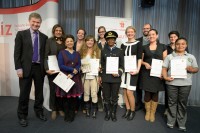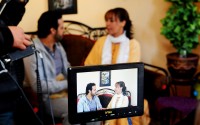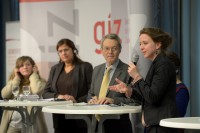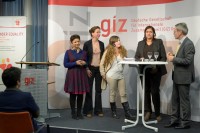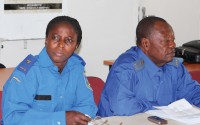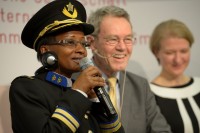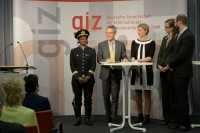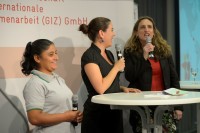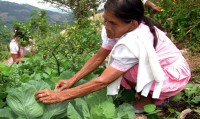Top 10 Gender Competition 2014
Shaking up gender roles in the “land of never-ever”
Innovative pedagogical approaches to promote bottom-up transformation
Context and initiative
“Our society is not ready yet!” is a common phrase one is confronted with in the course of working to promote gender equality in Morocco. Since the “democratic spring” in 2011, the country is marked by contradictory tendencies in terms of gender equality: on the one hand, the new constitution of 2011 holds the state responsible for achieving gender parity. On the other hand, ideas of traditional, complementary gender roles have gained support in public discourse.
In order to support a bottom-up transformation of gender perceptions and roles, the GIZ project joined forces with the local women’s rights organization Fédération de la Ligue Démocratique des Droits des Femmes and the Moroccanbased international organization Quartiers du Monde to develop innovative pedagogical material that draws on popular education approaches. This is how the “Land of Never-ever” was born – a trainer’s toolkit that builds upon a fictional world in which the roles of men and women are inversed: women are in power and take political and economic decisions; men fight against cultural stereotypes and day-to-day discrimination. The toolkit provides trainers with a series of short movies and manuals, adaptable to various contexts and target groups, on subjects such as political participation, sexual harassment and economic inequality.
Gender – a quality feature of our work
The innovative gender approach used in the “Land of Never-ever” fully convinced the project’s government partner institutions, which helped to initiate new collaborations. The National Human Rights Council took over the patronage of the project; the Ministry of Interior uses the material in its work with female community representatives; and the Ministry of Solidarity, Women, Family and Social Affairs commissioned the project and its partnering NGOs to produce further movies and manuals. The material and films will also be used within a project by Quartiers du Monde’s Network Femmes du Monde co-financed by the French Agence Française de Développement in Columbia, Bolivia and Senegal. These new partnerships not only confirm the need for new creative approaches. They also show that dialogue and exchange between institutions from diverse political backgrounds and with differing value systems can be successfully initiated through the work on a common, innovative product.
Gender impact
The presentation of men and women in situations of inversed inequality aims to challenge common social constructions of gender roles and the acceptance of discrimination against women. Feedback received from participants of the training confirms the approach to be successful:
“We are so used to things as they are. We don’t realize anymore that there’s something wrong. When you see the boy being harassed in the movie, it reminds us that that’s not normal, that it is an act of violence.” Souad, Fédération de la Ligue Démocratique des Droits des Femmes
“The visual is important! The movies help to put oneself in the place of the other. This will be very useful for the work with young men.” Mohamed, National Human Rights Council
“We need this moment of shock if we want to achieve change! That’s what will push people to ask questions, to start rethinking the status quo.” Hamid, Social Development Agency
Contact
Annalena Edler
Integration of the gender approach in Moroccan economic and social policy
T: +212 (0) 537- 67 52 63
+212 (0) 537- 72 79 12
E: Annalena.edler@giz.de
I: Giz-maroc@giz.de
Dorothea Otremba
Gender-Ansprechperson des Bereichs 3
T: +49 6196 79-2747
E: dorothea.otremba@giz.de
Supporting the police in fighting gender based violence
Police Programme Africa – Democratic Republic of the Congo (DRC)
CONTEXT AND INITIATIVE
As a result of violent conflicts, impunity and deeply embedded traditional, socio-cultural norms and beliefs, sexual and gender based violence (SGBV) is a widespread problem in the DRC. In most cases, the primarily male perpetrators are not prosecuted, while the victims
– mainly women and children – face physical and psychological health problems, stigmatization, and socioeconomic marginalisation. The Congolese National Police (PNC) has been largely unable to assume its role of preventing and combatting SGBV, on the grounds of inadequate training, a lack of human resources and equipment, as well as corruption. Citizens often perceive the police force more as a threat than as a source of protection.
On behalf of the German Federal Foreign Office, GIZ is supporting the PNC since 2008. The goal is to enhance PNC’s capacities and to build trust and confidence among citizens. Special emphasis was given to professionalizing and strengthening the police in combating SGBV in eastern Congo. A holistic approach was applied in order to enhance framework conditions as well as institutional and individual capacities. Working towards gender responsive policing by respecting the needs of female citizens and victims, the project fostered the presence and advancement of women in the police force. Other activities included training of policemen and -women, sensitization for SGBV, constructing and equipping police stations according to international standards, promoting cooperation between the police and the judiciary, and connecting victims to organizations that provide legal and medical aid.
The activities were planned and implemented in close cooperation with the PNC, as well as with the EU police mission (EUPOL RD Congo), the EU Commission’s justice project (REJUSCO), the UN peacekeeping mission (MONUSCO1), and civil society organizations.
GENDER – A QUALITY FEATURE OF OUR WORK
Together with its partners, the project played a key role in inspiring other international donors to expand their activities in eastern Congo. Due to its successful work, the EU entrusted the project with the expansion of its activities regarding SGBV in three further provinces in 2013, in the framework of a larger EU programme with UNICEF.
GENDER IMPACT
The project contributed towards the achievement of equal rights of women and children, violence prevention, and the effective prosecution of gender-related crimes. Job opportunities for and the acceptance of women within the male-dominated police force have increased, and monitoring of SGBV-related data throughout criminal procedures has improved. Through the project’s results-based monitoring, the impact and also the extent of the participation of policewomen in project activities could be tracked. The results and lessons learnt have been shared with colleagues from other police-supporting projects within GIZ, and have been disseminated both in Germany and DRC.
Contact
Elke Szögy
Africa Police Programme – D.R. Congo
Deutsche Gesellschaft für Internationale Zusammenarbeit (GIZ) GmbH
447 Av. du Cercle
Kinshasa Gombe
M: +243 998 073009
E: elke.szoegy@giz.de
I: www.giz.de/en/worldwide/19919.html
Family vegetable gardens: Promoting Gender equality Trifinio region (Guatemala, Honduras, El Salvador)
Protection of troopical forests and watershed management
CONTEXT AND INITIATIVE
The Trifinio Region is the border area shared by El Salvador, Guatemala and Honduras, as defined in the Trifinio Treaty and Plan. Here gender-based discrimination and women’s
marginalisation are widespread phenomena. This is particularly true for Mayan women in rural communities, such as the Quequesque in Guatemala and the Barrancón in Honduras.
In these communities, 95 % of women are illiterate and have never participated in any form of training. To make things worse, the majority of them are victims of domestic violence.
In cooperation with the Tri-national Commission of the Trifinio Plan, the CAMARENA-GIZ Programme aims to improve the living standards of families in the above mentioned communities by introducing sustainable agriculture systems, amongst other initiatives.
A gender analysis revealing low rates of participation among women led to the definition of a new strategy including concrete measures to encourage women’s participation. The initiative family vegetable gardens is one of them.
STRATEGY
The initiative was designed with the Institute of Permaculture in El Salvador and used the farmer to farmer methodology. It is made up primarily of the following course modules:
- Improve food security (60 % of the infants suffer from chronic malnutrition) and increase self-esteem. During a programme year women receive training, establish their own garden and participate in discussion groups to improve their knowledge and self-esteem.
- Improve inter-familial relationships. For six months women and men work together in their diversified milpa (field with corn and beans) and take decisions together.
- Improve family income and financial autonomy of the women. Women work in their garden with the help of their family members and sell part of their harvest in the community.
IMPACT
The Programme’s monitoring system is based on the three dimensions of sustainability:
Economic: In the summer months the vegetable gardens account for an additional family income of 30 %, which is controlled by women.
Environmental: Better farming practices are introduced, which contribute to the adaptation to climate change and enrich bio-diversity.
Social: A strong sense of belonging is developed within the groups. This improves their individual self-esteem and reciprocal trust. Men expressed their admiration for the work done by their spouses and recognised their contribution to the family’s income.
GENDER – A QUALITY FEATURE OF OUR WORK
As a whole, participation of women in other activities of the Programme increased by 85 %.
In the meantime other institutions have joined the initiative. Plan Trifinio donated a micro-drip irrigation system to each woman participating in the scheme. The Guatemalan Ministry of Agriculture, Livestock and Food has assigned a female field technician to the group and provides seeds and other supplies. The Coffee & Climate Initiative (GIZ, Neumann group) offered one of their courses to women in neighbouring communities.
Contact
GIZ El Salvador /CAMARENA Program
Plan Trifinio, Esquipulas, Guatemala
T: +503- 7943 4317
E: prog.bosquesyagua@gmail.com

 GIZ Gender Website
GIZ Gender Website